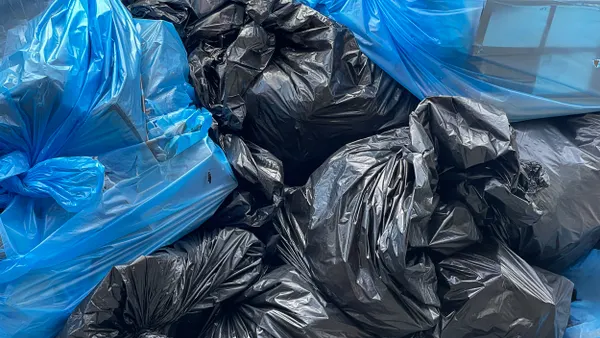Dive Brief:
- Philadelphia Mayor Jim Kenney recently announced the new "Philacycle" community engagement program, as reported by The Philadelphia Sunday Sun, in the latest step of the city's evolving plans to achieve "zero waste" by 2035. This will combine Philadelphia Recycling Rewards, Recyclebank and the Office of Sustainability’s Waste Watcher’s Program.
- Residents can still earn reward points for recycling participation and education, either online or through a mobile app, but this new program will go beyond that model. Through Philacycle, residents can now earn points by completing training as recycling volunteers for major events such as the Philadelphia Marathon or "captains" that can educate their neighbors and lead local litter clean-ups.
- This program was rolled out for America Recycles Day at the ReCommunity Recycling MRF in Philadelphia. In a nod to ongoing industry trends, Recyclebank made reducing contamination part of its broader educational offerings this year.
Dive Insight:
Philadelphia's "zero waste" process began in earnest close to a year ago, when Kenney formed a Zero Waste & Litter Cabinet with the mission of developing tangible steps toward reaching the 2035 goal. The fine print on that goal is to achieve 90% diversion, with the remainder going to waste-to-energy. Philadelphia's overall diversion rate currently sits around 40%. Earlier this year, Philadelphia released an action plan detailing what comes next and public engagement was seen as a key element.
"People need to be connected back to the waste that they create. So it can't just all be on city government," Nic Esposito, director of zero waste and litter for city, told Waste Dive in August. "People need to kind of be thinking about what they're creating, what they're producing."
The hope is that engaging residents around both household recycling habits and education, with rewards geared toward buying more sustainable products, will give Philadelphia a solid foundation for the harder work to come. Esposito said that the city already has a strong network of community volunteers who can hopefully help spread the message to their fellow residents.
Connecting this energy with recycling and organics collection at large city events will help with the broader diversion goal while also raising awareness. When more complex conversations come up in the future about curbside organics collection or changes to commercial recycling practices, then there will hopefully be a stronger foundation of public support.
Philadelphia's approach is different than how some other cities have rolled out their own "zero waste" programs, often from the top-down with resident engagement a secondary priority, and could be a model for others that are considering similar plans. While some cities such as Fort Worth, TX have moved away from the Recyclebank program after mixed results, others such as Phoenix have found it useful. The results from Philadelphia will be telling both for the future of the rewards model itself and community engagement strategies for recycling programs of all kinds.











